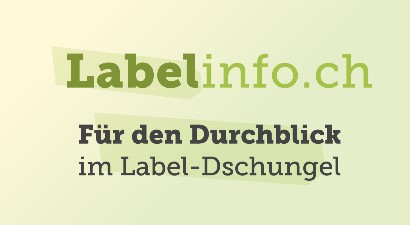We can only achieve true sustainability by working together and taking many small and large steps in the process. Below you will find an overview of some of the initiatives supported by the ministries involved in Siegelklarheit, which open up further opportunities for you to engage with the topic of sustainable consumption beyond labels.
Green Button
The Green Button is a government-run certification label for sustainable textiles. It sets demanding requirements to protect people and the environment in global production processes of textiles.
What makes it special: The Green Button evaluates whether companies fulfil their human rights and environmental due diligence obligations along the supply chain. In addition, there must be proof in the form of recognised certification labels that the respective article has been produced in a socially and environmentally sound manner. This is proven through labels that cover the requirements in the relevant supply chain stages and are recognised as credible according to the methodology of Siegelklarheit. Therefore, the Green Button itself is not rated on Siegelklarheit. Furthermore, with setting due diligence requirements, the Green Button covers a topic that goes beyond the criteria of Siegelklarheit
Both Siegelklarheit and the Green Button therefore provide orientation for consumers.
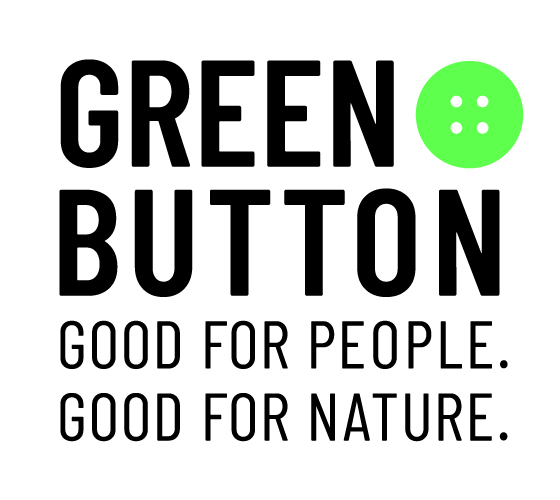
Partnership for Sustainable Textiles
The Partnership for Sustainable Textiles is a multi-stakeholder initiative with around 120 members from companies, associations, trade unions, civil society, standard setting organisations and the German Federal Government.
As the first point of contact for all companies that want to fulfil their environmental and human rights due diligence obligation throughout the supply chain, it offers a network and support. The focus is on due diligence.
.jpg)
Sustainability Compass
Kompass Nachhaltigkeit (Sustainability Compass) provides comprehensive information on sustainable public procurement in Germany. In addition to information on public procurement law, the Sustainability Compass also contains practical examples as well as text modules for tender documents and a Standard Comparison Tool.
A list of suppliers shows companies that offer sustainable articles suitable for procurement with certain standards. Procurers can thus quickly obtain information on the sustainable procurement of contracts.

The new EU energy label - saving electricity costs and protecting the environment
Energy efficiency is a key factor when deciding which electrical appliances to buy. The EU energy label is a reliable guide. It shows the energy consumption of products in a transparent manner and provides information on other product characteristics such as water consumption or volume. Consumers can thus easily compare different appliances, save money and pay attention to sustainability.
In recent years, many technical innovations have led to significant improvements in energy efficiency. For this reason, a new EU energy label has been in place for some products (refrigerators and freezers, dishwashers, washing machines incl. washer-dryers, electronic displays incl. televisions) since March 2021. Other product groups will follow gradually. For example, the EU energy label for light bulbs was introduced on September 1, 2021.
Another new feature is the QR code on the EU energy label, which links to the European product database EPREL. There, consumers can obtain further extensive information on the product. Practical tips on purchasing and energy-efficient operation of electrically powered products are provided by the energy label app, which is available free of charge.
(German only)
_medium.jpg)
SME Compass
Before consumers buy products, for example, in department stores they have to be produced first. Sustainability is becoming increasingly important in that regard: How can companies ensure that they reduce the negative impact of chemicals on the environment in the production of their products and that workers' rights are respected? This is where the SME Compass comes in.
The SME Compass is an online portal for the implementation of human rights and environmental due diligence processes in production, especially for small and medium-sized enterprises (SMEs). It takes a closer look at the entire supply chain, which often includes several countries, for example, because individual parts are produced in different factories. The SME Compass offers two instruments for this process:
The Due Diligence Compass helps to understand sector-specific risks as well as to help to develop strategies to effectively adapt supply chains when needed. The second instrument, the Standards Compass, provides an overview of the contribution that sustainability standards play in the implementation of due diligence processes and can therefore offer orientation for SMEs.
The SME Compass is offered by the Helpdesk on Business & Human Rights with support from GIZ.
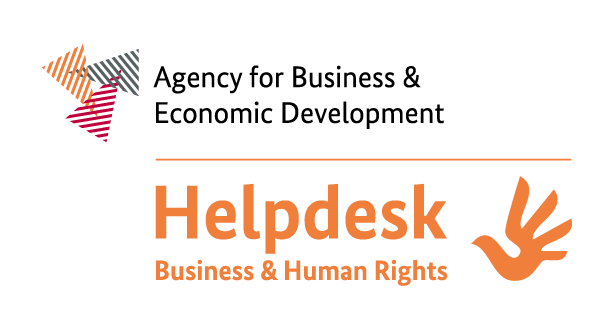
Competence Centre Sustainable Consumption
Whether it's food, mobility or clothing, consumption as a cross-cutting issue encompasses all areas of our everyday lives. Accordingly, many ministries and stakeholders are involved in promoting sustainable consumption in Germany.
The Competence Center for Sustainable Consumption (KNK) was established to support their cooperation, the networking of activities, and the exchange and provision of knowledge. Subordinate authorities of several participating ministries work closely together in the Competence Center, and the office is located at the German Environment Agency (UBA).
(German only)
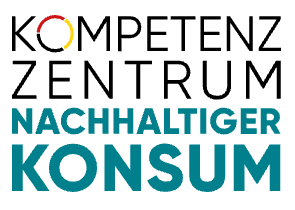
Think Factory Consumption
Buying organic products, doing without a car - do individual consumption decisions save the climate? Or are stricter laws and green companies the levers for a sustainable lifestyle? The Think Factory Consumption (Denkwerkstatt Konsum) helps to better understand sustainable consumption. The educational tool is aimed primarily at interested consumers as well as environmental educators, environmental activists.
The Factory of the German Environment Agency (UBA) focuses on the social dimension of sustainable consumption. It takes the perspective from the "we to the I" and from the "I to the we" and thus makes it clear that sustainable consumption is not a purely individual matter, but that each individual can still make a difference.
(Germany only)
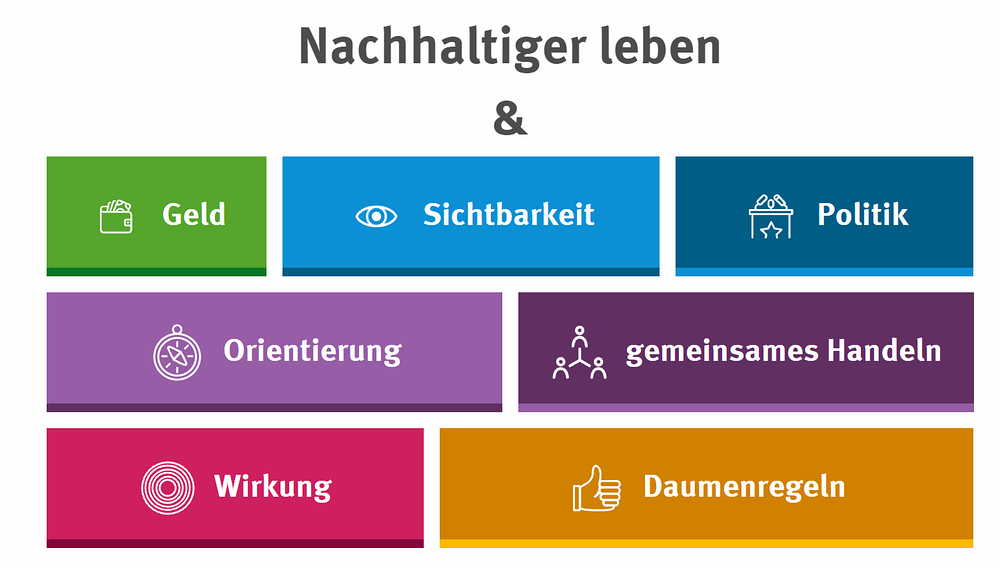
UN Global Compact Network Germany
The United Nations Global Compact is the world's largest initiative for sustainable and responsible corporate governance: More than 23,000 companies and organizations worldwide have signed the Global Compact and its ten universal principles.
The UN Global Compact Network Germany (UN GCG) is one of the largest of the approximately 70 local networks of the UN Global Compact. Through learning formats such as webinars, trainings, peer learning groups or online tools, the network supports the currently more than 1,000 German signatories in contributing to an inclusive and sustainable global economy. With the aim of initiating change processes in companies and strategically integrating sustainability, the UN GCG focuses on the topics of human rights and labor standards, environment and climate, anti-corruption and reporting, as well as on the 17 SDGs.

Labelinfo.ch
For more than 20 years, the Swiss platform www.labelinfo.ch has been offering consumers orientation in the label jungle. The platform has now been fundamentally revised in terms of content and design and has been online with a new look sinceJune 2023. The new website and assessment methodology have been developed with the aim of providing consumers and professional procurers with structured information on the various sustainability labels available on the Swiss market.
The methodology is based on the methodology behind Siegelklarheit, the Sustainable Standards Comparison Tool (SSCT), and uses the Standards Map database of the International Trade Centre (ITC). It was adapted and expanded for the Labelinfo.ch platform by the Institute for Environment and Natural Resources (IUNR) of the Zurich University of Applied Sciences (ZHAW), while the label evaluation is carried out by the Foundation for Practical Environmental Protection (Pusch).
Only sustainability labels used on products or services in the Swiss market are selected and evaluated. As part of the relaunch of Labelinfo.ch, 41 sustainability labels in the food sector were initially re-evaluated. Over the next few months, further sustainability labels will be evaluated in the product groups textiles, electronic devices, paper and detergents and cleaning agents.
(German only)
